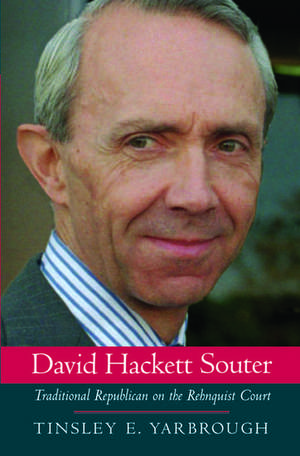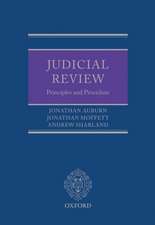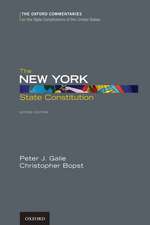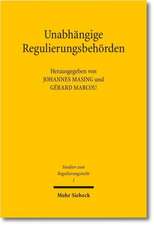David Hackett Souter: Traditional Republican on the Rehnquist Court
Autor Tinsley E. Yarbroughen Limba Engleză Hardback – 20 oct 2005
Preț: 347.74 lei
Preț vechi: 401.70 lei
-13% Nou
Puncte Express: 522
Preț estimativ în valută:
66.54€ • 69.48$ • 54.95£
66.54€ • 69.48$ • 54.95£
Carte tipărită la comandă
Livrare economică 04-10 aprilie
Preluare comenzi: 021 569.72.76
Specificații
ISBN-13: 9780195159332
ISBN-10: 0195159330
Pagini: 336
Ilustrații: numerous halftones
Dimensiuni: 165 x 242 x 27 mm
Greutate: 0.62 kg
Ediția:Cloth.
Editura: Oxford University Press
Colecția OUP USA
Locul publicării:New York, United States
ISBN-10: 0195159330
Pagini: 336
Ilustrații: numerous halftones
Dimensiuni: 165 x 242 x 27 mm
Greutate: 0.62 kg
Ediția:Cloth.
Editura: Oxford University Press
Colecția OUP USA
Locul publicării:New York, United States
Recenzii
"Tinsley Yarbrough provides a marvelous portrait of David Souter both as a jurist and as a man, and explains why his traditional New England conservatism has made him a key member of the centrist coalition that has dominated the Supreme Court for over a decade. And, sadly, he also makes clear why the ultra-conservative wing of the Republican Party will never, if it can help it, allow another such open-minded person on the nation's highest court."--Melvin I. Urofsky, Professor of History and Public Policy, Virginia Commonwealth University
"Yarbrough has written a masterful, very human, portrait of America's 105th Justice of the U.S. Supreme Court, David Hackett Souter. As with Yarbrough's other biographies of American jurists, he, seemingly effortlessly, captures the essential qualities of Souter's personality, jurisprudence, and his work on the Court and presents these insights in beautifully written yet thoroughly scholarly prose. After reading this book, one "knows" Justice Souter,"Hackett," the way one "knows" a very close friend."--Howard Ball, author of Murder in Mississippi
"Tinsley Yarbrough, the most prolific living biographer of Supreme Court justices, has done it again. This time he has given us a readable, carefully researched, and persuasively argued book about David H. Souter, a traditional Republican who has forthrightly supported liberal positions on civil liberties and abortion. Today, Yarbrough cogently explains, Souter would never be appointed by George W. Bush, the son of the president that did appoint him. Yarbrough mixes personal history with a careful understanding of the case law, the other justices, and the larger political climate to produce a compelling study in both judicial style and courage."--Kermit L. Hall, President and Professor of History, State University of New York at Albany
"Conservatives view the first President Bush's appointment of David H. Souter as a huge miscalculation, and the results seem to bear them out. Souter has voted with the liberals on abortion, separation of church and state, federal legislative power, and Bush v. Gore. In this penetrating analysis, Tinsley E. Yarbrough attributes Justice Souter's decisions to an unwilligness to uproot precedent and a respect for "our settled law." Yarbrough persuasively depicts Souter as an exemplar of the common-law tradition and places him squarely in the mold of Yarbrough's previous subject, the second Justice Harlan."--John Jeffries, Dean, University of Virginia School of Law
"Yarbrough has written a masterful, very human, portrait of America's 105th Justice of the U.S. Supreme Court, David Hackett Souter. As with Yarbrough's other biographies of American jurists, he, seemingly effortlessly, captures the essential qualities of Souter's personality, jurisprudence, and his work on the Court and presents these insights in beautifully written yet thoroughly scholarly prose. After reading this book, one "knows" Justice Souter,"Hackett," the way one "knows" a very close friend."--Howard Ball, author of Murder in Mississippi
"Tinsley Yarbrough, the most prolific living biographer of Supreme Court justices, has done it again. This time he has given us a readable, carefully researched, and persuasively argued book about David H. Souter, a traditional Republican who has forthrightly supported liberal positions on civil liberties and abortion. Today, Yarbrough cogently explains, Souter would never be appointed by George W. Bush, the son of the president that did appoint him. Yarbrough mixes personal history with a careful understanding of the case law, the other justices, and the larger political climate to produce a compelling study in both judicial style and courage."--Kermit L. Hall, President and Professor of History, State University of New York at Albany
"Conservatives view the first President Bush's appointment of David H. Souter as a huge miscalculation, and the results seem to bear them out. Souter has voted with the liberals on abortion, separation of church and state, federal legislative power, and Bush v. Gore. In this penetrating analysis, Tinsley E. Yarbrough attributes Justice Souter's decisions to an unwilligness to uproot precedent and a respect for "our settled law." Yarbrough persuasively depicts Souter as an exemplar of the common-law tradition and places him squarely in the mold of Yarbrough's previous subject, the second Justice Harlan."--John Jeffries, Dean, University of Virginia School of Law
Notă biografică
Tinsley E. Yarbrough is Arts and Sciences Distinguished Professor, Department of Political Science, East Carolina University. His books include The Rehnquist Court and the Constitution, Judicial Enigma: The First Justice Harlan, John Marshall Harlan: Great Dissenter of the Warren Court, and Judge Frank Johnson and Human Rights in Alabama, for which he won an ABA Silver Gavel Award. He lives in Greenville, North Carolina.











